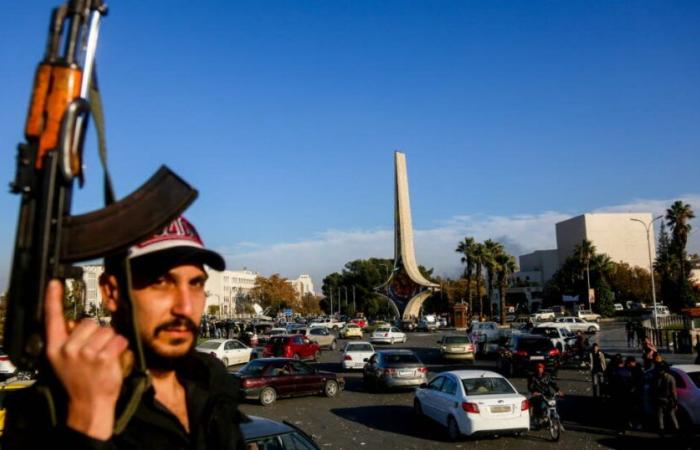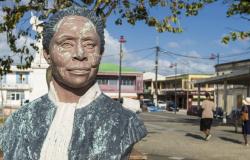
Three days after the fall of Bashar al-Assad's regimewhose family ruled Syria with an iron fist for more than five decades, Syrian rebels handed power to Mohammad al-Bashir, the prime minister in charge of the transition. We take stock of the situation in the country this Wednesday.
No amnesty for those guilty of torturing detainees
The leader of the Syrian rebels said on Wednesday that those involved in the torture of detainees would not be pardoned, after the release of thousands of prisoners from the infamous jails of the Assad clan.
“We will not provide amnesty to those involved in the torture and elimination of detainees and we will pursue them in our country,” said Abu Muhammad al-Jolani, asking other countries to hand over “all the criminals who fled so that 'They are brought to justice.'
Tomb of former president burned
After the dismantled statues of former President Hafez Al–Assad, the tomb of the former leader was set on fire this Wednesday by rebel fighters. Hafez al-Assad ruled Syria for three decades until his death in 2000, when his son, Bashar al-Assad, became president. This tomb was located in a mausoleum in the Alawite region of Latakia. Inside the structure topped by a majestic dome and adorned with decorations carved into stone, men waved the flag of the Syrian revolution.
The city of Deir Ezzor in the hands of the rebels
The Syrian rebels who took power in Damascus after ousting Bashar al-Assad announced Tuesday evening that they had captured the town of Deir Ezzor in the east of the country. L'Syrian Observatory for Human Rights claimed that the Kurdish forces present in the town had retreated towards the surrounding localities.
Prime Minister calls on Syrians to return
At the same time, the Prime Minister responsible for the transition in Syria, Mohammad al-Bashir, immediately appointed, promised calm and stability to the Syrians. This Wednesday, he also assured that the rights of all faiths will be guaranteed in the country, in an interview with the Italian daily Corriere della Sera. Recognizing “the erroneous behavior of certain Islamist groups”, he insisted that “the meaning of Islam, which is the 'religion of justice', has therefore been distorted”.
He also called on Syrians abroad to return home: “Their human capital, their experience will allow the country to prosper. I appeal to all Syrians abroad: Syria is now a free country that has earned its pride and dignity. Come back. We need to rebuild, be reborn and we need everyone’s help,” he said.
Blinken in Jordan and Türkiye to discuss Syria
The head of American diplomacy Antony Blinken will travel to Jordan, then to Turkey, for talks on Syria after the overthrow of Bashar al-Assad. The talks will be held on Thursday in Aqaba, on the Red Sea, and a day later in Ankara, the Turkish capital. Antony Blinken “will reiterate United States support for an inclusive, Syrian-led transition to a responsible and representative government,” said State Department spokesperson Matthew Miller.
Why has Israel been intervening in Syria since Sunday?
Since the fall of Bashar al-Assad, Israel's enemy, Israeli Prime Minister Benjamin Netanyahu affirmed that his country “will not allow any hostile force to establish itself on its border.” The army said it had carried out hundreds of strikes in several towns in neighboring Syria in 48 hours against strategic military sites “to prevent them from falling into the hands of terrorist elements”. Israeli leaders appear to fear chaos is brewing in Syria and are acting accordingly, experts say.
Israeli Defense Minister Israel Katz ordered the army to establish “a zone free of weapons and terrorist threats in southern Syria.” Previously, Israeli troops took up positions “in the buffer zone” on the edge of the part of the Syrian Golan occupied by Israel. According to a UN official in New York, who asked not to be named, Israeli forces occupy seven positions in the buffer zone.
Paris calls on Israel to “withdraw” from the buffer zone in Syria
France on Wednesday called on “Israel to withdraw from the buffer zone” established between the Jewish state and Syria, as well as “to respect the sovereignty and territorial integrity of Syria,” the ministry reported. of Foreign Affairs. “Any military deployment in the separation zone between Israel and Syria constitutes a violation of the 1974 disengagement agreement, which must be respected by its signatories, Israel and Syria,” insists the Quai d'Orsay.
The head of German diplomacy Annalena Baerbock urged Turkey and Israel on Wednesday not to jeopardize the possibility of a peaceful transition in Syria after the fall of Bashar al-Assad on Sunday. “If we want a peaceful Syria, the territorial integrity of the country must not be called into question and the neighbors,” she said.
France





